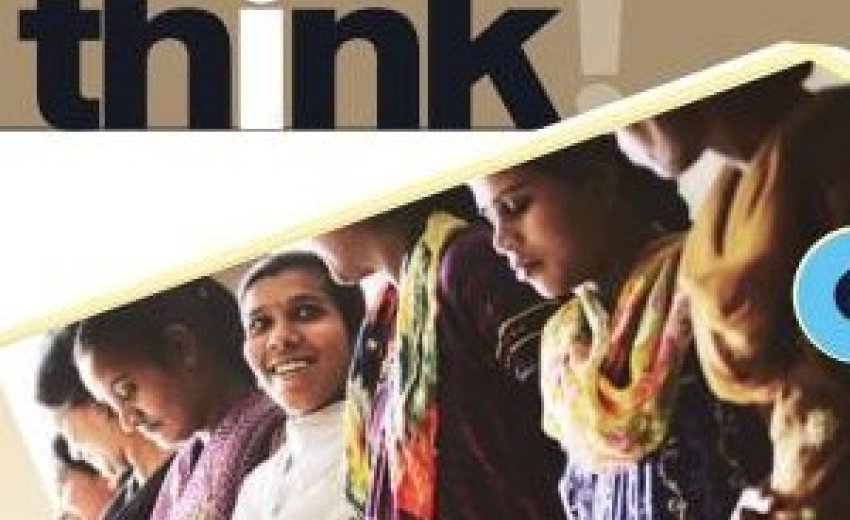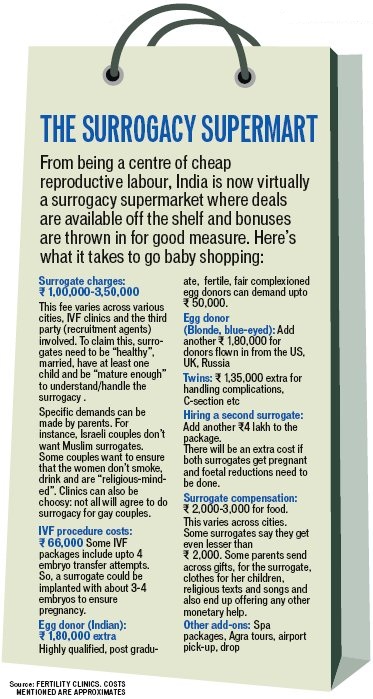
wombsonhire
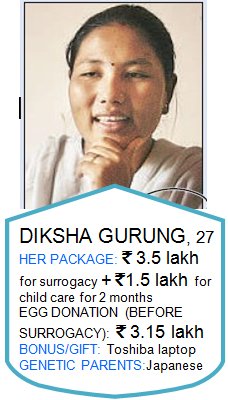 For Diksha Gurung (left), and Ganga
Bhujal, a lot rests on getting pregnant.
"With my first surrogacy (fee), I could
get my husband's kidney operation done,
admit my son in an English medium
school, and buy a small flat," Diksha,
the 27-year-old housewife and mother
of two, who moved from Nepal to
Ahmedabad with her husband about a
decade ago, rattles off.
At Dr Nayana Patel's clinic in Gujarat's
Anand district - this is the sisters' second
surrogacy since 2008 - getting pregnant
is a moment of great relief.
Diksha, who had already donated her eggs
six times before she became a surrogate,
was lucky to get pregnant in the first try.
The "Japanese partywaale (intended parents)"
chose her since she had donated
eggs for them earlier, she says.
Diksha's egg donations got her about
` 3.15 lakh. Her sister Ganga, 23, left her
job in Kuwait after she was abused at
her employers', but couldn't return to
her family in Nepal until she had enough
money. For both sisters then, a package
in lakhs, obviously, meant a lot. It didn't
matter that the neighbours initially
gossiped that surrogacy work made
them "prostitutes".
But it's hard to give away the children,
they admit. Ganga hasn't seen her
own child for five years now. With the
surrogacy (fee), she will now be able to meet her own daughter. |
Even as the Draft Assisted
Reproductive Technology
Bill and Rules, 2010, is being
reviewed by the law ministry
for a fortnight - it's likely
to be introduced in the
Parliament's Monsoon session - India's
acknowledged 'booming market' for
'cheap' reproductive labour and IVF
services is under scrutiny. For many
parents, however, going onto the surrogacy
'market', is the only recourse,
they say. And India, where commercial
surrogacy is allowed, is the destination.
Thirty-something Amit Mehta (name
changed) insists on being just a voice
on the phone. "I am in India," is all he
is willing to reveal. Amit has his reasons:
two years back, he and wife Sunita
chose an agency in Los Angeles to
'commission' a surrogacy for around
28,000 dollars (` 14 lakh), a procedure
that would have cost less than half in
India. "We were at a crucial stage in
our careers and my wife couldn't take
time out for pregnancy," says Amit
Mehta. So we decided to outsource it.
We didn't want anyone to know so routed
it through US."
THE PROPOSED BILL
The surrogacy market has been largely
unregulated. There is the Indian Council of
Medical Research (ICMR) guidelines - but
they are not binding. Now, the latest version
of the Bill is being looked at closely. Its pluses:
it includes single parents, reduces the
age of surrogates from 45 to 35 years, and
makes it mandatory for foreign couples to
declare that their countries permit surrogacy.
Activists, however, point out loopholes:
_________________________________
*The major payment (75 %) to be made
only after delivery.
_________________________________
*The surrogate can't donate eggs so the
infertile couple will need an egg donor. "A surrogate
will now be subject to a hazardous and
expensive procedure like IVF rather than a
simpler one like intra uterine insemination
(IUI)," says NB Sarojini of NGO Sama.
________________________________
*Insurance: Provides for 'appropriate' insurance
cover for the surrogate. But this kind
of insurance and the 'appropriateness' for it
is not defined. The responsibility of the commissioning
parents post-delivery and followup
care of the surrogate is also not clear,
according to Sama.
________________________________
*IVF cycles: There's no limit to the number
of IVF cycles the surrogate will have to
go through for one birth.
________________________________
*A local guardian to keep a 'close watch'
on the surrogate may hamper her freedom. |
Mehta routed it through Los Angeles based
Rudy Rupak of PlanetHospital,
one of the several medical tourism agencies
that have sprung up in the US that
liaise between American parents and
Indian clinics/surrogates.
PACKAGED DELIVERY
As the Bill shuttles between ministries,
in the industry of reproductive
outsourcing (estimated to be worth over
2000 crores), wombs can now be hired
for the 'best' price and children are delivered
through 'low cost' and 'easily
affordable' packages. Now, the latest
pitch is to offer customised and affordable
packages.
This 'boom' is supported by a set of
guidelines (designed by the Indian
Council of Medical Research) that is
one of the most lax regulatory mechanisms
for those offering and commissioning
surrogacy. (In contrast, most
European countries, and Hong Kong
and Japan in Asia either explicitly ban
commercial surrogacy, or have strict
rules governing it.) Add to that the price
factor: surrogacy in the US could cost
upto 65 lakh as opposed to the 500-odd
Indian clinics where costs could work
out within 4 lakh - and India wins
hands down.
And where there's a market, there are
price differentials: between 8 and 22 lakh,
the 'commissioning' parents are spoilt
for choice. At Planet Hospital, for example,
a couple can choose between 'economical'
packages starting from around
15 lakh, and offering four transplants with
upto four surrogates. The package
includes 'recruiting' the surrogate(s) in
India, upto four embryo transfers, checking
the surrogate's background, her
allowances and legal work.
For international couples, egg donors
can be sourced from South Africa,
Russia, the UK, US and of course, the
rising number of egg banks in India,
where skin color, education, background
are - almost - for the asking.
"Multi-racial babies are considered
more attractive," reveals Dr Shivani
Sachdev Gaur, fertility specialist at
Phoenix hospital, Greater Kailash, Delhi.
There's also another special service:
at Rudy Rupak's, you can opt for sex
selection, a practice that is legal in the
US, but not in India.
"The procedure is done in Panama,
where it is legal. Two-three couples
from India have already opted for it,"
says Rupak.
| ( |
64 % of my clients
are Indians, of which,
37 %
are NRIs
Dr. NAYANA PATEL
Akanksha Fertility Clinic, Gujarat |
) |
CHOICE, BUT FOR WHOM?
For those seeking 'quality', India
offers a lot of options. Jagatjeet Singh,
owner of Wyzax Medical Tourism,
Janakpuri, says he has an established
"professional network" of surrogate
agents across North India: some of
whom boast upto "300 potentials" ready
for surrogacy. Indian surrogates are
preferred because of "good looks, education
and good ethics", including nosmoking
and drinking habits, he says.
At the bottom of the 'package' pyramid
is someone like Radhika Kumar
(name changed), 35, a housewife from
Orissa and now a surrogate for an
American couple. This is her second
surrogacy. And that's where the story
starts to get worrying. While Rupak
insists he will not allow Radhika, a mother
of two, to become a surrogate again,
there's no telling that she won't be
tempted, especially in an unregulated
market where everyone decides the
rules of the game. Says Singh: "It's a
dirty business. I pay my agent R 4 lakh
per surrogate, but I am sure they end
up paying only about ` 1-2 lakh."
The ICMR guidelines allow upto 3
embryos transfers per surrogate, but
there are packages that promise upto
4-5 embryo transfers leading to the danger
of multiple pregnancies and foetal
reductions.
Women's groups argue that it's unfair
that the surrogate is required to underplay
her bond with the child at every
stage: she is not allowed to even breastfeed
the child. Doctors such as
Janakpuri-based Dr Manika Khanna,
an infertility specialist, point out to
"exploitation" at the hands of the surrogate's
husband, who often bargain
for a higher compensation, or threaten
to terminate the pregnancy midway.
But for Kumar, it's worked out well.
At least, for now. "Back home, I lied to
everyone that I am away working as a
baby sitter in Mumbai for a few months.
But it's all for my family's good only."
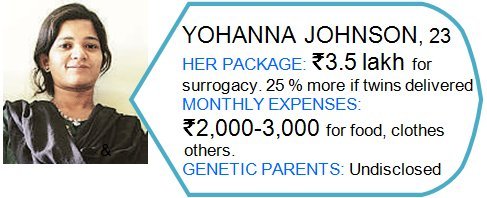
When Yohanna M Johnson's sister-inlaw
suggested she become a surrogate,
she thought that she could finally
buy her own house in Gujarat's
Anand district.
"Bus (Ok), this is the last time," she
says, after asking to finish the interview
early since the "twins inside" were
making it tough for her.
Her husband, who works as a
welder, and earns ` 2,000-3,000 is supporting
her through this, and even
"gets her food" everyday at the surrogate
house of Dr Nayana Patel.
"Everytime he comes to see me,"
she says wistfully, "this is all he says:
'Come home soon.'" |
 |
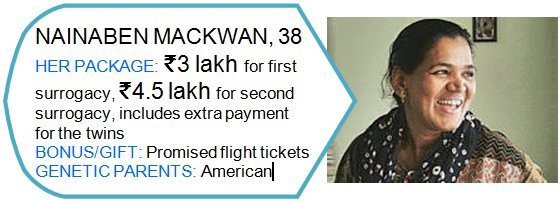
In 2008, Nainaben, a former nurse,
had read about surrogacy in a local
paper, and thought it might be an
answer to her financial woes. The first
time it was for the children's education.
After the first surrogacy, she left
her job as a nurse. Her husband runs
a local marriage bureau. Together,
they would make around
` 10,000, and
with two kids it was certainly hard to
pull it off.
"I was a nurse, so I knew how it
worked," she says, explaining how she
convinced her husband and kids. So
when the same couple approached her
the second time last year, Nainaben
thought this time she could get some
money to travel to Israel for a job.
"They were happy with me last time,"
she says. Now, after she delivered
twins through a ceasarian section two
months ago, the commissioning parents
have promised to help out with
her flight tickets as well.
"Of course, I miss the children I
have given away," she says. "But you
learn to cope when you have to plan
the best for your kids. See, in Israel,
I will get ` 50,000 every month there.
Can I ever earn that much here?
Never!."
- Namita Kohli. |
|



